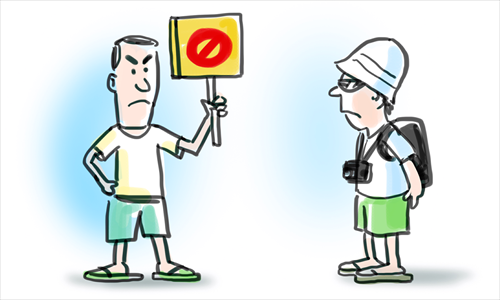HOME >> OP-ED, LAZY PACK
HK trader protests show ugly side of society
By Hilton Yip Source:Global Times Published: 2015-3-9 22:18:01

Illustration: Liu Rui/GT
At the beginning of March, Hong Kong is seeing more protests against mainland visitors. In Yuen Long on March 1, things got rowdy as protesters confronted police and counter-protesters, and dozens were arrested. This protest and another one that happened on Sunday were the third and fourth in five weeks, signifying a recent escalation of anger against mainland visitors.The protests were held to vent frustrations about the high number of mainland tourists to Hong Kong, specifically parallel traders who buy things in bulk in Hong Kong and resell them in the mainland for profit.
The New Territories, where previous protests took place, gets a lot of parallel traders due to its proximity to the border. As a result, there has been a proliferation of stores specifically selling goods catering to them such as toothpaste, milk powder and cosmetics.
Many Hongkongers feel resentment toward the traders because they cause product scarcity and enable both stores to raise prices and landlords to raise rents, which drive out other types of businesses.
This resentment ties in with a broader feeling of dissatisfaction with the influx of mainland visitors to Hong Kong. There were over 47 million mainland visitors in 2014, several times Hong Kong's population of 7 million. Mounting frustration has made some Hongkongers call on the authorities to restrict mainland visitors, especially traders, who mostly use multi-entry permits and are not normal tourists.
This demand is actually not unreasonable. However, the way some Hongkongers are carrying out their protests is, and that is a growing problem.
While the vast majority of Hongkongers, whatever their stance on mainland visitors, do not harbor such harsh feelings, a number of people like these protesters are becoming more callous in their actions and words. Their attitude at times is almost xenophobic and that is inexcusable.
The recent protests saw physical confrontations between protesters and mainland visitors, with the police having to get involved. Protesters carried banners calling on mainlanders to get out of Hong Kong and referring to them as locusts, a pejorative term that was coined for mainland visitors a few years ago.
This vicious sentiment is actually not recent, but has been present since at least 2012. That year saw some people put up an advertisement in a local newspaper calling mainlander visitors "locusts" for using up local resources such as maternity beds. Last year, there were street demonstrations that saw Hongkongers heckle mainland tourists and march through streets holding banners calling on mainlanders to get out.
On the Internet, things are just as bad with even more heated exchanges and angry messages. There has been a huge increase in vicious online postings from Hongkongers and mainlanders since the Spring Festival. In response to calls from some Hongkongers to limit the individual travel scheme for mainland visitors at the end of February, some mainland netizens started forwarding messages on social media urging the authorities to cut off supplies of water, electricity and food to Hong Kong in retaliation.
Hongkongers need to face up to some unpleasant aspects of their own society. The harsh prejudice that some of them hold as exemplified by actions like calling mainlanders locusts did not appear out of thin air.
For decades, some Hongkongers have had a sense of superiority over mainlanders who they saw as poor and less sophisticated. This feeling of superiority has also extended to other groups like Southeast Asians, especially Filipino and Indonesian migrant workers. The sense of being better than mainlanders has caused an arrogance that has shifted to insecurity in current times.
There is no doubt that many Hongkongers are frustrated at the rising influx of mainland visitors. Problems of overcrowding and competition for goods with mainlanders, augmented by internal issues like a shortage of good jobs, have caused many young people to feel despondent over their society. But, anger over an unjust situation does not give people the right to attack or verbally abuse innocent people randomly.
As Hong Kong authorities have taken note of the frustrations of their people and try to find a solution, it is also time that these protesters need to reconsider their actions. Otherwise, they risk diminishing the strength of their legitimate grievances and losing any moral ground whatsoever.
The author is an editor with the Global Times. hcpyip@gmail.com
Posted in: Viewpoint, Commentary